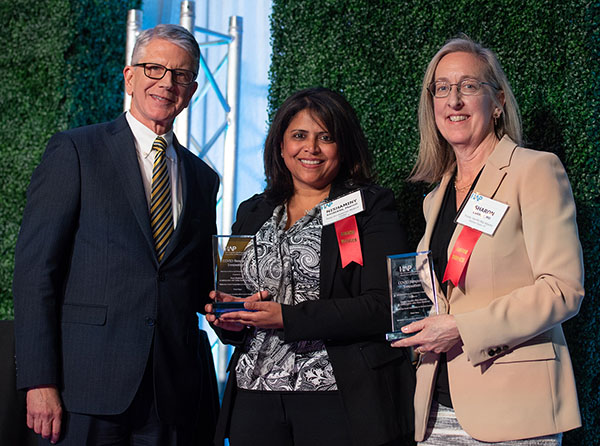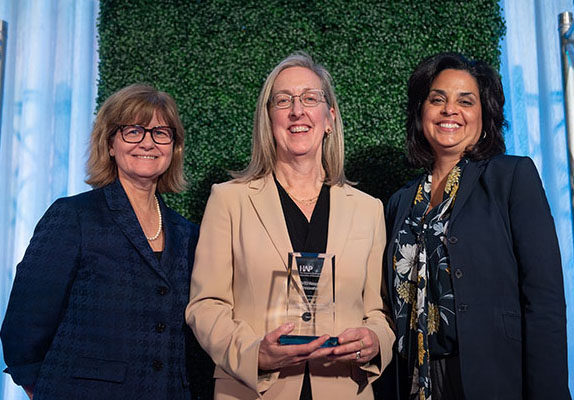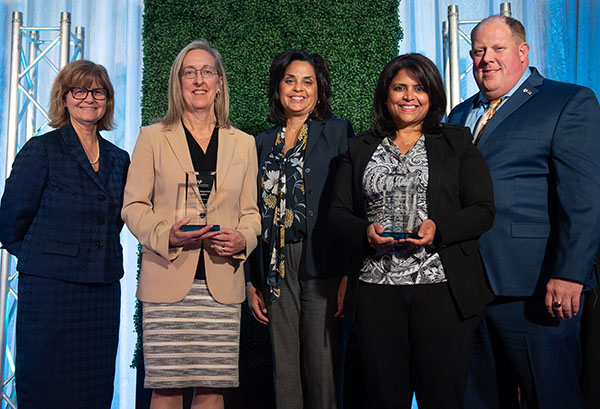Philadelphia hospitals recognized for innovative COVID-19 vaccine efforts
May 10, 2022 CHOP, Penn Medicine and Trinity Health Mid-Atlantic among top honorees for statewide award
CHOP, Penn Medicine and Trinity Health Mid-Atlantic among top honorees for statewide award
Harrisburg, PA (March 31, 2022) – Two projects that focused on safeguarding Philadelphians’ health during the COVID-19 pandemic are among the top honorees for a statewide award spotlighting Pennsylvania hospitals’ pandemic response.
The Hospital and Healthsystem Association of Pennsylvania’s (HAP) COVID Response Innovation Awards showcase the innovative teams, solutions, and projects that have helped shape the health care community’s response to, understanding of, and resilience to the COVID-19 pandemic.
Children’s Hospital of Philadelphia (CHOP) won the first-place award for its efforts to support the health and development of Philadelphia children by facilitating early access to COVID-19 vaccines for school and childcare employees. Penn Medicine and Trinity Health Mid-Atlantic took third place for their partnership addressing racial inequities in COVID-19 vaccine access.
“Pennsylvania hospitals have not only protected the health of their communities during this pandemic but have also been leaders in finding innovative solutions to the unprecedented challenges caused by COVID-19,” HAP President and CEO Andy Carter said. “These awards recognize the exceptional health care teams that developed creative strategies to meet their communities’ needs and address issues such as vaccine access, racial disparities in vaccination, and medical supply chain disruptions.”
 The winners were selected from nearly 80 blinded entries that were evaluated by a group of independent judges from Pennsylvania and across the nation.
The winners were selected from nearly 80 blinded entries that were evaluated by a group of independent judges from Pennsylvania and across the nation.
CHOP partnered with the Philadelphia Department of Public Health, public and private school leaders, and childcare providers to vaccinate more than 19,000 school and daycare personnel throughout the city during early 2021. The aim was to allow a safe return to in-person instruction, a crucial step for students’ mental health and academic development.
“We saw that some kids in virtual school were struggling with mental, social, and academic problems and realized that the best thing we could do for them was help them to return to the classroom safely,” said Ron Keren, MD, MPH, chief medical officer at CHOP. “Through successful collaboration with our community and school partners, we were able to administer COVID-19 vaccines to school and daycare personnel to help them feel safe and comfortable returning to in-person instruction. We are humbled to be recognized by HAP for our efforts to support the educational system and the wellbeing of the children of Philadelphia.”
Penn Medicine and Trinity Health Mid-Atlantic partnered with Black community leaders to establish rotating community vaccine clinics in Philadelphia neighborhoods that addressed racial barriers to access early in the vaccine rollout. By March 2021, the partnership vaccinated 2,821 people, 85 percent of whom were Black, via three mass vaccination clinics. The effort ultimately administered 60,000 vaccines doses across the larger Philadelphia region, more than one-third of them in the targeted neighborhoods.
 “Our team’s vaccination efforts put equity at the center, making it easy for members of our community to get information about the vaccine and receive answers to their questions, simple to sign up for shots, and convenient to get them, in nearby locations like churches, rec centers, and schools,” said University of Pennsylvania Health System CEO Kevin B. Mahoney. “We are extremely proud to have built a barrier-free path to get lifesaving shots, which has been a crucial foundation for keeping our communities safe over the past year since vaccines became available.”
“Our team’s vaccination efforts put equity at the center, making it easy for members of our community to get information about the vaccine and receive answers to their questions, simple to sign up for shots, and convenient to get them, in nearby locations like churches, rec centers, and schools,” said University of Pennsylvania Health System CEO Kevin B. Mahoney. “We are extremely proud to have built a barrier-free path to get lifesaving shots, which has been a crucial foundation for keeping our communities safe over the past year since vaccines became available.”
“We are grateful for HAP’s recognition of our collaborative effort,” said Sharon Carney, MD, senior vice president and chief clinical officer for Trinity Health Mid-Atlantic. “It’s been well-documented that communities of color—especially Black and Hispanic people—were less likely to take the COVID-19 vaccine early on in the pandemic. We sought to reverse that trend by eliminating barriers and educating our community that vaccination stops the spread and prevents unnecessary deaths. Partnering with Penn Medicine was easy, as we share common goals, and together with our community and religious leaders we’ve made measurable differences. In the end, however, the true winners are the people of the Greater Philadelphia Region.”
